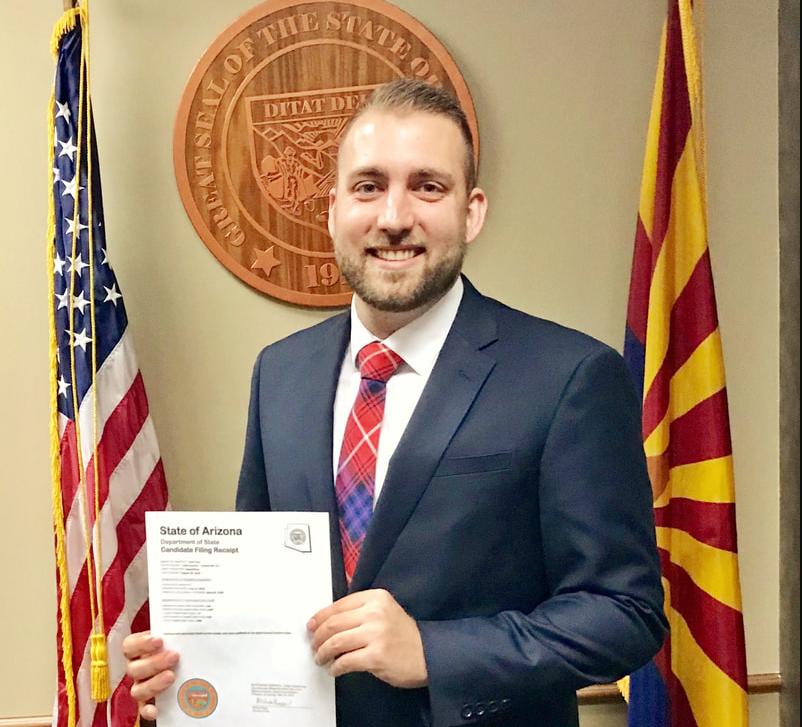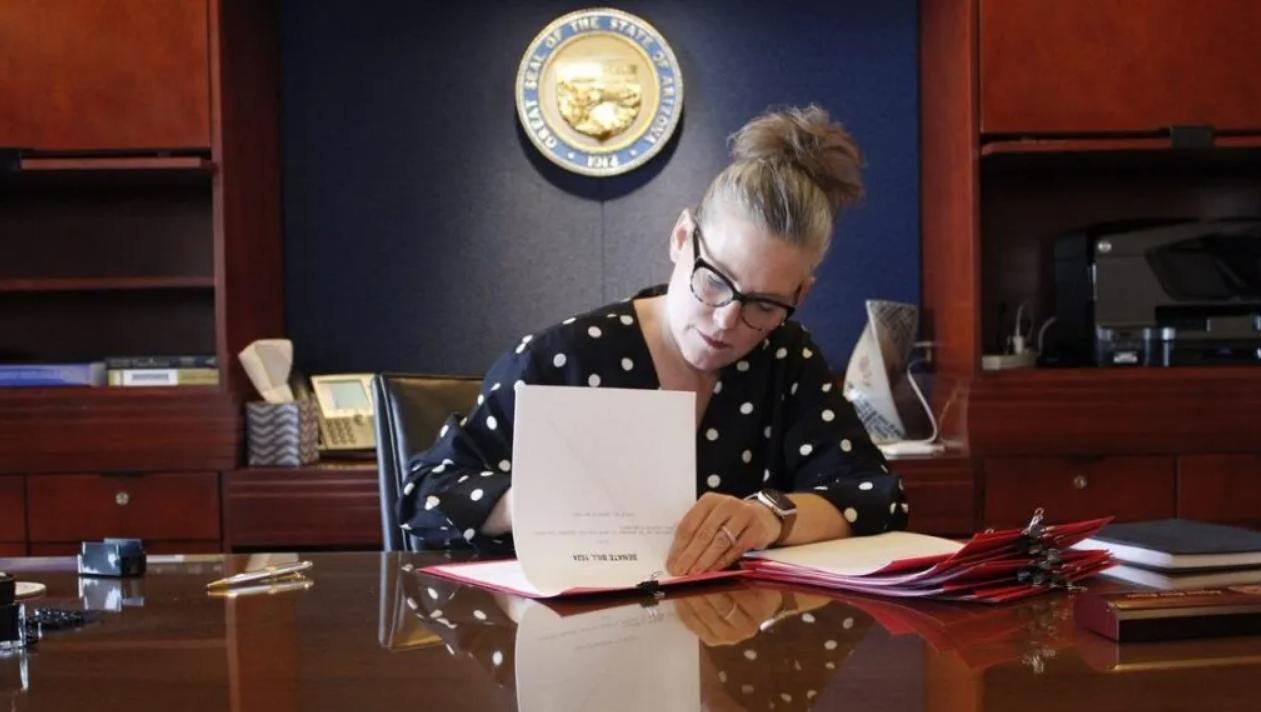Arizona
Arizona Republican breaks from party to block anti-trans bill
SB 1138 sought to ban gender-affirming care for LGBTQ youth.

A bill aiming to ban gender-affirming care for LGBTQ youth in Arizona is effectively dead after Republican state Sen. Tyler Pace broke from his party last week and voted against the legislation.
The rare and unexpected move came last Wednesday with Pace joining three Democratic colleagues on the Arizona Legislature’s Health and Human Services Committee, splitting the vote 4-4 and effectively stalling the bill.
Though Pace saw “both sides,” he attributed his vote to the testimony of LGBTQ youth and their parents against the anti-transgender youth health care bill.
“The testimonies we heard today about the many people who are using these avenues of medical treatments to save lives, to improve lives,” he said during the committee hearing, “I don’t want my vote to stop those great things.”
At the hearing, trans youth and their families stood in front of the committee to testify against the anti-trans bill.
“Kids like me should be able to be who they are without lawmakers attacking their rights,” said Samuel Cars, who identifies as trans and bisexual. “I ask you when you vote on this bill to think about me and this question: What side of history do you want to be on? Because the only way to be on the right side is vote no on this bill.”
Other people who spoke to the committee noted how the bill could increase suicide rates for trans youth in the state. Late last year, LGBTQ youth suicide prevention group the Trevor Project found a strong link between gender-affirming therapy and lower rates of suicide and depression in trans youth.
The legislation – Senate Bill 1138, which sought to ban gender-affirming care to trans and nonbinary youth, including reversible puberty blockers, hormone therapy and surgeries – was one of Arizona’s 15 anti-LGBTQ bills introduced so far this year, the most of any state, according to NBC News.
Pro-LGBTQ activists and lawmakers grew so concerned over the legislative landscape that they hosted a press conference last month, sounding alarm bells over the anti-LGBTQ bills.
“This is an attack on human rights,” said Arizona state Rep. César Chávez, chair of the Arizona LGBTQ Legislative Caucus, at the press conference hosted by the Human Rights Campaign. “We’re criminalizing individuals for being who they are. On top of that, we’re criminalizing doctors and health care workers, individuals that are doing their job.”
The Arizona state Senate passed an anti-trans sports bill at the beginning of February that would restrict trans women and girls from playing on school sports teams that match their gender identity. Pace voted in favor of the legislation.
Last year, Arkansas and Tennessee passed similar gender-affirming care bans, making them the only two states in the country to do so. However, a federal judge blocked the Arkansas ban last summer, according to LGBTQ research nonprofit the Movement Advancement Project (MAP).
MAP also notes that Tennessee’s law prohibits medical providers from providing hormone-related medication to “prepubertal minors.”
“Best practice medical care for transgender youth only includes such medication once a youth has entered puberty, not prior to it, and this further illustrates how these legislative efforts reflect a fundamental lack of understanding of medical care for transgender youth,” it added. “However, this legislation sets a dangerous precedent for further restrictions of medical care for transgender youth.”
Arizona
Ariz. governor vetoes anti-transgender, Ten Commandments bill
Katie Hobbs has pledged to reject anti-LGBTQ bills that reach her desk

BY CAITLIN SIEVERS | A slew of Republican bills, including those that would have allowed discrimination against transgender people and would have given public school teachers a green light to post the Ten Commandments in their classrooms, were vetoed by Gov. Katie Hobbs on Tuesday.
Hobbs, who has made it clear that she’ll use her veto power on any bills that don’t have bipartisan support — and especially ones that discriminate against the LGBTQ community — vetoed 13 bills, bringing her count for this year to 42.
Republicans responded with obvious outrage to Hobbs’s veto of their “Arizona Women’s Bill of Rights,” which would have eliminated any mention of gender in state law, replacing it with a strict and inflexible definition of biological sex. The bill would have called for the separation of sports teams, locker rooms, bathrooms, and even domestic violence shelters and sexual assault crisis centers by biological sex, not gender identity, green-lighting discrimination against trans Arizonans.
“As I have said time and again, I will not sign legislation that attacks Arizonans,” Hobbs wrote in a brief letter explaining why she vetoed Senate Bill 1628.
The Arizona Senate Republicans’ response to the veto was filled with discriminatory language about trans people and accused them of merely pretending to be a gender different than they were assigned at birth.
“With the radical Left attempting to force upon society the notion that science doesn’t matter, and biological males can be considered females if they ‘feel’ like they are, Katie Hobbs and Democrats at the Arizona State Legislature are showing their irresponsible disregard for the safety and well-being of women and girls in our state by killing the Arizona Women’s Bill of Rights,” Senate Republicans wrote in a statement.
The Senate Republicans went on to accuse the Democrats who voted against the bill of endangering women.
“Instead of helping these confused boys and men, Democrats are only fueling the dysfunction by pretending biological sex doesn’t matter,” Senate President Warren Petersen said in the statement. “Our daughters, granddaughters, nieces, and neighbors are growing up in a dangerous time where they are living with an increased risk of being victimized in public bathrooms, showers, and locker rooms because Democrats are now welcoming biological males into what used to be traditionally safe, single-sex spaces.”
But trans advocates say, and at least one study has found, that there’s no evidence allowing trans people to use the bathroom that aligns with their identity makes those spaces less safe for everyone else who uses them.
In the statement, the bill’s sponsor, Sen. Sine Kerr (R-Buckeye), claimed that the bill would have stopped trans girls from competing in girls sports, something she said gives them an unfair advantage. But Republicans already passed a law to do just that in 2022, when Republican Gov. Doug Ducey was still in office, though that law is not currently being enforced amidst a court challenge filed by two trans athletes.
Republicans also clapped back at Hobbs’ veto of Senate Bill 1151, which would have allowed teachers or administrators to teach or post the Ten Commandments in public school classrooms, a measure that some Republicans even questioned as possibly unconstitutional.
In a statement, the bill’s sponsor, Sen. Anthony Kern (R-Glendale), accused Hobbs of “abandoning God” with her veto.
“As society increasingly strays away from God and the moral principles our nation was founded upon, Katie Hobbs is contributing to the cultural degradation within Arizona by vetoing legislation today that would have allowed public schools to include the Ten Commandments in classrooms,” Kern said in the statement.
In her veto letter, Hobbs said she questioned the constitutionality of the bill, and also called it unnecessary. During discussion of the bill in March, several critics pointed out that posting the Ten Commandments in public school classrooms, tenets of Judeo-Christian religions, might make children whose families practice other religions feel uncomfortable.
“Sadly, Katie Hobbs’ veto is a prime example of Democrats’ efforts to push state-sponsored atheism while robbing Arizona’s children of the opportunity to flourish with a healthy moral compass,” Kern said.
Another Republican proposal on Hobbs’s veto list was Senate Bill 1097, which would have made school board candidates declare a party affiliation. School board races in Arizona are currently nonpartisan.
“This bill will further the politicization and polarization of Arizona’s school district governing boards whose focus should remain on making the best decisions for students,” Hobbs wrote in her veto letter. “Partisan politics do not belong in Arizona’s schools.”
******************************************************************************************

Caitlin joined the Arizona Mirror in 2022 with almost 10 years of experience as a reporter and editor, holding local government leaders accountable from newsrooms across the West and Midwest. She’s won statewide awards in Nebraska, Indiana and Wisconsin for reporting, photography and commentary.
******************************************************************************************
The preceding piece was previously published by the Arizona Mirror and is republished with permission.
Amplifying the voices of Arizonans whose stories are unheard; shining a light on the relationships between people, power and policy; and holding public officials to account.
Arizona Mirror is part of States Newsroom, the nation’s largest state-focused nonprofit news organization.

BY ERIN REED | In a stunning defeat for anti-transgender activists in Arizona, a major bill targeting trans people in schools has failed. The bill, Senate Concurrent Resolution 1013, would have banned trans students from using bathrooms matching their gender identity. It also would have forced teachers to misgender their trans students unless parental permission was received.
Most importantly, the bill would have placed the issues on the November election ballot, bypassing Arizona Gov. Katie Hobbs’ veto, which has been used against similar legislation. This represents the first major ballot referendum on trans people that has been defeated in 2024 and could signal Republican hesitancy around the electoral impacts of such referendums.
The bill was brought forward by Sen. John Kavanaugh, who has previously sponsored other legislation targeting trans people in schools. Kavanaugh’s district includes portions of Scottsdale, Ariz., which is notably the same city where the Alliance Defending Freedom is headquartered.
The ADF has been intricately involved in the drafting and defending of anti-trans laws across the U.S. this year and has backed Chloe Cole, who is leading a similar referendum effort in California.
In the Senate Education Committee earlier this month, over 500 people registered opposition to the bill, and only 32 registered in favor, one of the most lopsided testimony ratios in any bill this year nationwide. Speaking against the bill in the hearing, Democratic Sen. Christine Marsh pointed out the negative consequences that hearing such a bill would have, stating, “This will become a debate on a statewide level harming god knows how many kids and forcing them into further isolation, harassment, bullying, victimization and vulnerability that comes. I think the effect of that will be incalculable.”
When it came time for a committee decision, Republican Sen. Ken Bennett voted in favor of the bill but stated he had concerns with the way the bill was written and that he would have trouble supporting it for final passage in the Senate.
Then, on Monday, the bill was brought forward for a final vote on the full Senate floor. Democratic senators read statements from parents and trans youth who would be impacted by the bill as the votes rolled in. Then, Bennett voted “no,” explaining his vote: “I am very concerned about putting this bill to a vote of the people. These bills combined are roughly a third of the entire U.S. Constitution. When we put things on the ballot for people to vote on them, if something goes awry, if there are unintended consequences, we have to go back to the people to fix it.”
The defeat means that in Arizona, the question will not advance to the November ballot. However, in other states, ballot measures are currently being pursued. In California, the group “Protect Kids California” has enlisted high-profile anti-trans activists such as Cole and Chris Elston to collect signatures. Measures there would out trans students to their parents, ban them from participating in sports and using bathrooms that match their gender identity, and would ban gender-affirming care for trans youth. Similar ballot measures are also being pursued in Colorado. Nevertheless, with the defeat of SCR1013, there may be hesitancy to push for this as a major ballot issue in 2024 in a swing state like Arizona.
Anti-LGBTQ legislation is not highly popular, especially in general election contests. In the most recent school board elections in 2023, Moms for Liberty lost 70 percent of their school board elections, having run primarily on anti-trans issues in schools. Meanwhile, Democrats took the House and Senate in Virginia after Gov. Glenn Youngkin pushed a party platform at rallies that targeted trans youth throughout the state. Anti-trans politics have also previously failed to help Republicans in Arizona. In the 2022 governor’s race, Republicans attempted to target Hobbs’ husband for providing counseling for trans youth in the closing weeks of the campaign — a gambit that failed to swing results in their favor.
That is certainly what Gaelle Esposito, a partner at Creosote Partners who has worked with major organizations supporting trans people in the state, believes. When asked about what the bill’s defeat says in an election year, she responded, “we are also starting to see that Republicans recognize that anti-trans hatred and pure bigotry is not a big winner for them. It’s not like they have seen time and again, including here in Arizona, that this just doesn’t play well with voters. It doesn’t sit well with people.”
Esposito added a hopeful message: “The fact that we didn’t see the full force of their network trying to squeeze them to get this on the ballot shows they know it too. That they, in an election year here in Arizona, where so much is critical for them, this went down in flames … I think shows how the tide is turning in our favor.”
***************************************************************************
Erin Reed is a transgender woman and researcher who tracks anti-LGBTQ+ legislation around the world and helps people become better advocates for their queer family, friends, colleagues and community. Reed also is a social media consultant and public speaker.
The preceding post was previously published at Erin in the Morning and is republished with permission.
Arizona
Arizona Governor issues executive order banning conversion therapy
Hobbs also signed an executive order to ensure the state employee health care plan covers medically-necessary gender-affirming surgery

Arizona Governor Katie Hobbs signing an executive order Tuesday banning the dangerous and discredited practice of conversion therapy. With the signing of this executive order, Arizona is now the 27th state in the country to enact protections against the practice of conversion therapy.
Hobbs also signed an executive order to ensure the state employee health care plan covers medically-necessary gender-affirming surgery.
“Our LGBTQ+ community should never have to face hate and discrimination, and I will do everything in my power to fight for full equality,” said Governor Hobbs. “The State is leading by example on this issue, and we will continue working until Arizona is a place where every individual can participate equally in our economy and our workforce without fear of discrimination or exclusion.”
As outlined in the Executive Order restricting conversion therapy, State Agencies will implement policies to actively protect LGBTQ+ minors from the harmful effects of conversion therapy and ensure public funds are not spent on these dangerous practices.
The American Psychological Association found that conversion therapy contributes to increased risk of suicide, depression, and substance use throughout an individual’s life. Additionally, the federal Substance Abuse and Mental Health Services Administration has determined that conversion therapy should not be a part of any behavioral health treatment.
“Equality Arizona is excited to see Governor Hobbs take bold executive action to protect the LGBTQ+ community,” said Jeanne Woodbury, Interim Executive Director for Equality Arizona. “Protecting Arizonans from fraudulent and harmful treatment is exactly what we elect our statewide leaders to accomplish, and taking action against conversion therapy is long overdue.”
Read the Executive Order on Ensuring Access to Medically Necessary Gender-Affirming Healthcare HERE.
Read the Executive Order on Protecting Young People from Conversion Therapy HERE.
-

 U.S. Supreme Court4 days ago
U.S. Supreme Court4 days agoSupreme Court upholds ACA rule that makes PrEP, other preventative care free
-

 U.S. Supreme Court4 days ago
U.S. Supreme Court4 days agoSupreme Court rules parents must have option to opt children out of LGBTQ-specific lessons
-

 National5 days ago
National5 days agoEvan Wolfson on the 10-year legacy of marriage equality
-

 Congress5 days ago
Congress5 days agoSenate parliamentarian orders removal of gender-affirming care ban from GOP reconciliation bill












